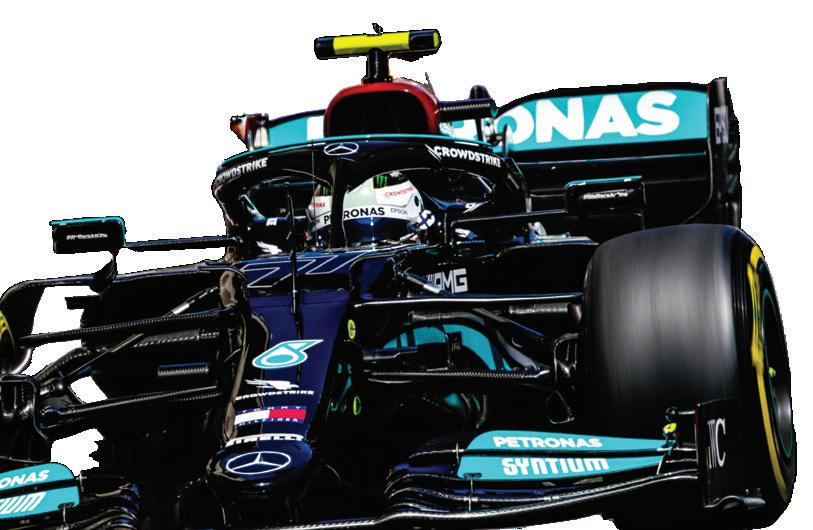





Having outlived the Berlin Wall, which was old as I was when it finally fell, I must now consider that I might also see the tumble of the Federal Wire Act. It’s only a month younger than myself and is danger of being rendered obsolete.
Ever wonder why sports betting in the United States is handled at the state level? Blame the Wire Act. Passed and signed in 1961, it makes interstate betting activity a crime.
Specifically, “Whoever being engaged in the business of betting or wagering knowingly uses a wire communication facility for the transmission in interstate or foreign commerce of bets or wagers or information assisting in the placing of bets or wagers on any sporting event or contest, or for the transmission of a wire communication which entitles the recipient to receive money or credit as a result of bets or wagers” qualifies for two years’ imprisonment, max.
As a consequence, for the past seven years, the sports betting industry has diligently, legally and expensively expanding its business on a state-bystate basis. Now it’s in serious danger of being undercut by a business that routinely flouts the Wire Act: prediction markets.
Recent prediction-market activity wagering on the papacy has a tradition that dates back to 1503. Election betting, a comparably distasteful predictionmarket favorite, has been practiced since 1884. But sports wagering is new. Prediction markets took bets on the 2025 Super Bowl, got away with it and haven’t looked back.
Where, you might ask, is the Commodity Futures Trading Commission in all this? During the Biden
RIGHT: David McKee, Editor in Chief, Sports Betting Operator
administration, it fought a valiant rearguard against runaway prediction markets.
Following the last election, Kalshi named Donald Trump Jr. “strategic advisor.”

Also, the new administration in Washington (headed by Donald Trump Sr.) appointed Kalshi board member Brian Quintenz to the CFTC, putting a fox in charge of the henhouse.
On May 5, the new-look CFTC took a dive, saying it would no longer oppose prediction-market activities like election wagering … and sports betting. Can you say “payoff”?
There’s still hope. Legal scholar I. Nelson Rose theorizes that it “is possible that creating a market for future events on NFL games may be going too far for some anti-gambling, states’ rights Attorney General or District Attorney. Illegal gambling triggers all of the organized crime statutes on the state as well as federal level.” We can only hope.
Be careful what you wish for, CFTC. Soon it may have to attempt the first-ever federal regulation of sports betting, with no infrastructure or experience in place. Good luck with that, fellas.
Since the new administration is, um, selective in its law enforcement, you can expect the Wire Act to gather cobwebs over the next four years.
You can bet on it.

Publisher – Peter White peter@outsourcedigitalmedia.com
Editor in Chief – David McKee dmckee314@gmail.com
Editor EMEA – Damien Connelly damien@outsourcedigitalmedia.com
Las Vegas Correspondent – Ryan Slattery ryanslats@gmail.com
Associate Editor EMEA – Andrew Behan a.behan@librasgroup.com
Designer – Stewart Hyde www.de5ign.co.uk
Tel: 44 (0) 1892 740869 W: www.sportsbettingoperator.com
Editorial Policy: The views and opinions expressed in Sports Betting Operator remain principally the views of contributors and do not necessarily reflect those of the editor or publishers.
The publishers wish to avoid inaccuracies and, whilst every precaution has been taken to ensure that information contained in this publication is accurate, no liability is accepted by the editor or publishers for errors or omissions, however caused.
Unless otherwise stated, articles appearing in this publication remain the copyright of the publishers and may not be reproduced in any form without the publisher’s written consent.
Printed in the UK by Acorn Web Offset Ltd.
Understanding the Impact of the 1968 Act casino
changes, self-service betting terminals and stake limits.
The economic and industrial impact of legal sports wagering in the United States.
social media and affiliate advertisers are exploiting the vulnerable.


Microbetting is the future of sports book engagement.
By Zaven Sahakyan, CEO, Gabsys
Speed, interaction and immersion are essential in today’s sports betting landscape. Audiences, particularly digital-savvy and mobile-first bettors, are not just passive observers; they want to engage in every moment of the game. Microbetting provides an immediate, action-packed experience that transforms how people connect with live sports.
Microbetting, or in-play event betting, allows players to bet on fast-paced
events within a live match. Instead of predicting the result, players can place bets on micro-moments such as:
• Will the next point in a tennis match be an ace?
• Will the next football throw-in go to Team A or Team B?
• Will the next basketball possession result in a turnover or a threepointer?
These bets resolve within seconds or minutes, not hours. This means more action, quicker outcomes and a completely redefined live-betting experience.
The appeal of microbetting lies in its real-time excitement and continuous interaction. Today’s players expect instant gratification and on-the-go entertainment. With microbetting, every moment presents an opportunity to play. It’s no longer just about sitting through 90 minutes to see if your bet wins; it’s about engaging minute by minute.
This short-cycle betting format also supports longer session times. Bettors remain engaged throughout the event instead of placing a pre-match bet and then switching off. This extended engagement provides operators with more opportunities to build brand loyalty, introduce new markets and cross-sell promotions.
At Gabsys, we have witnessed significant growth in the adoption of microbetting across our sports book platform, particularly in high-tempo sports like football, tennis, basketball and esports. Data shows that microbetting not only increases betting frequency, it also improves turnover and boosts retention, especially among younger demographics who demand fast, mobile, first-user experiences.
Successfully delivering microbetting requires more than just available markets; it demands robust infrastructure. At Gabsys, our solution is powered by an advanced trading engine and a team of over 800 inhouse traders who work in real-time to price, monitor, and manage micromarkets across thousands of live events.
Our trading team ensures that each market is accurately priced and properly managed, offering precision and speed at scale. Whether it’s a high-

profile football match or a midweek tennis tournament, we support our partners in delivering a smooth, dynamic betting experience without delays.
Operators can implement microbetting through our iFrame, bespoke user interface, or turnkey API integration, providing complete flexibility based on their platform needs. We offer end-to-end support, including technology, trading, and user experience, enabling partners to launch Microbetting quickly and effectively without stretching their resources.
Microbetting is not just a passing trend. It represents a strategic shift in how operators engage, retain and grow their customer base. It aligns with how today’s bettors think, feel and behave – impatient for outcomes, loyal to seamless experiences, engaged through constant interaction.
At Gabsys, microbetting will become a core engagement pillar for the next generation of sports books. If you’re looking to elevate live betting, foster deeper interaction and unlock new revenue streams, try it.

David McKee
I’ve continued to be really pleased.”
Thusly did Flutter Entertainment CEO Peter Jackson launch the latest quarterly earnings call. He had good reason to be pleased. His company had just realized a $335 million quarterly profit. It had lost $117 million a year earlier.
Revenues swelled to $3.7 billion, up eight percent, with cash flow of $616 million — a 20 percent increase. Sports betting handle grew eight percent, “in line with expectations with lower-thanexpected basketball handle, offset by stronger growth on other sports,” the company stated.
The revenue figure, fat though it was, may have come as a disappointment to Wall Street, relatively virgin territory for Flutter, parent of U.S. wagering giant FanDuel. Stock market boffins had expected 13 percent revenue growth, but Lady Luck had other ideas. Sports results in the United States were generally adverse, dampening revenues.
For Truist Securities analyst Barry Jonas, “our key takeaway [was] that it’s business as usual with more opportunities than threats.” Of adverse sports outcomes, he reported that Flutter was “seeing these results as transient and a positive for general sports engagement.”
Flutter offered bifurcated revenue guidance for the coming year to investors, sharpening some projections and dimming others. In Europe, everything was coming up roses: Overseas revenue forecasts were boosted 17 percent to $9.7 billion, but U.S. ones were dialed back four percent to $7.4 billion.
Even so, Jackson said, “I am pleased with the performance of the business during the first quarter. FanDuel continues to win in the U.S., retaining leadership positions in both online sports betting and iGaming, while we saw a positive performance within international [wagering].”

The same day that Flutter announced its first-quarter earnings, Jackson dispatched an open letter to shareholders, in which he reflected on the company’s domestic performance so far. “It is now just over 15 months since Flutter listed on the New York Stock Exchange and almost a year since our U.S. primary listing became effective, making it a suitable time to reflect on Flutter’s differentiated positioning and the significant global opportunity we see ahead,” he began.
Flutter, he said, “has access to a significant global market and runway of growth with the regulated sports betting and iGaming market expected to be worth” as much as $368 billion by 2030. “The Flutter Edge is our key sustainable competitive advantage and global differentiator which enables our local brands to both access and contribute to leading global capabilities across product, technology, expertise and scale.”
An increasingly apprehensive Wall Street was bound to raise macro-
Peter Jackson, CEO, Flutter Entertainment
economic concerns and Jackson was ready for them. He stated that Flutter had weathered “previous periods of consumer pressure” internationally with no discernible impact to its business. Jackson added that he was convinced that i-gaming and sports betting had “strong defensive characteristics” over the long haul.
The stock market and its quarterto-quarter (sometimes day-to-day) sensitivities were evidently of some concern to the CEO. He advised shareholders that “it is important to remember that we run the business for the long term, often making decisions that impact short-term profitability, for the greater benefit of longer-term profitability.
“The nature of sports results will also influence our quarterly results,” Jackson warned, “as we have seen in our most recent quarters, but over time these are transient and do not compromise our compelling growth model and long term value creation opportunity.
“Our basic business is resilient,”

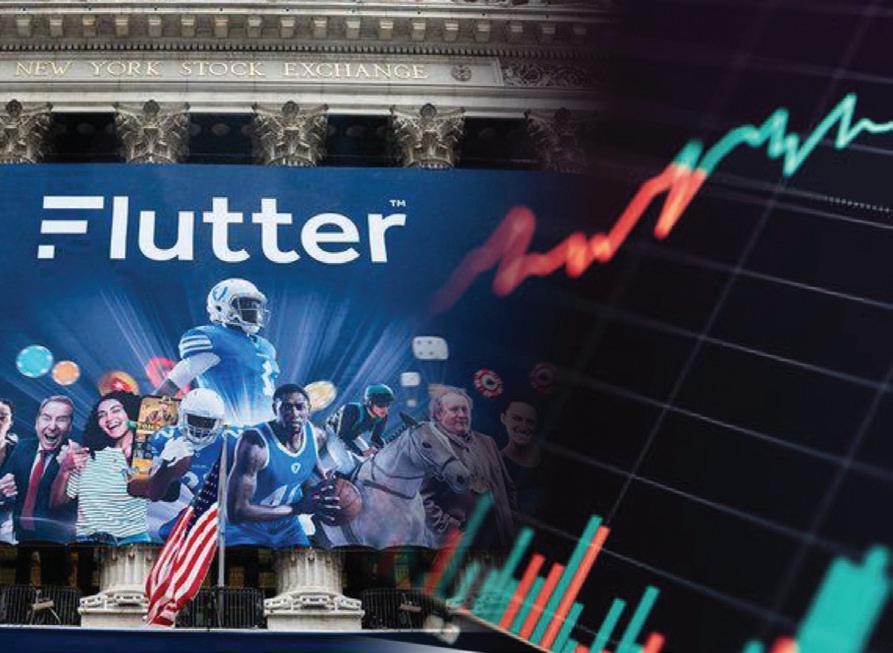
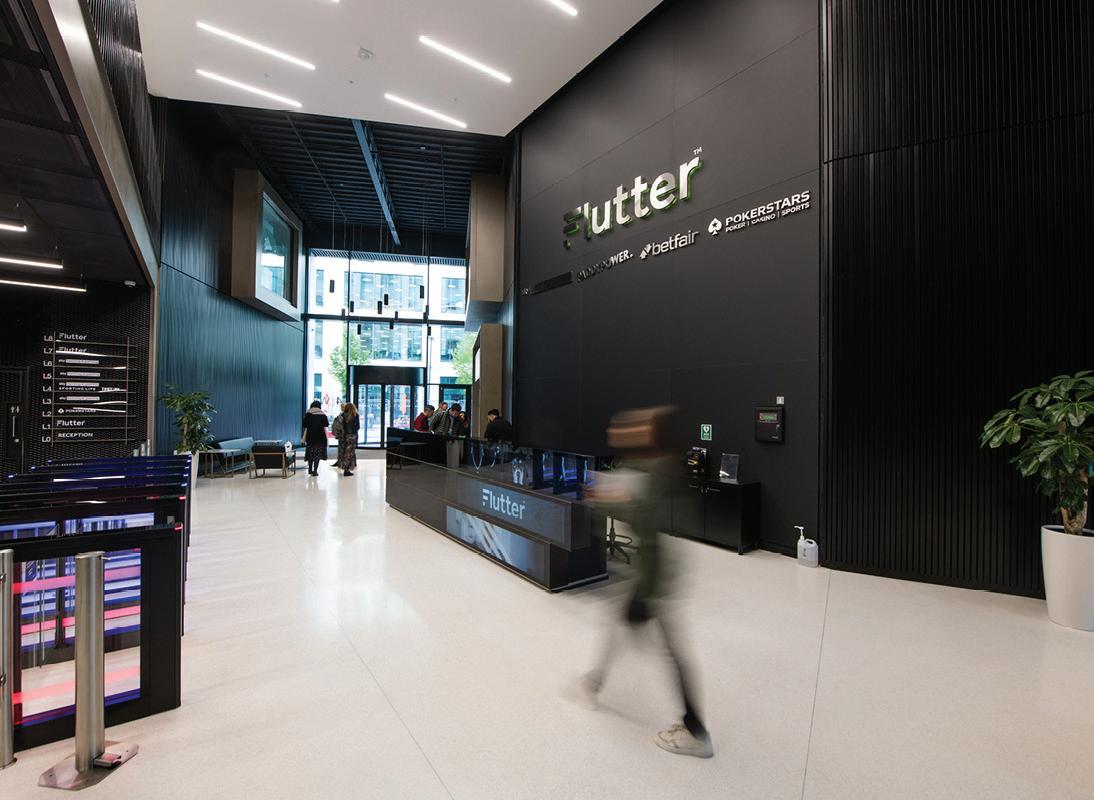
Jackson reiterated the following day, in a conference call. He underlined that he wasn’t fazed by recent economic challenges in the U.S. Nor was he bothered by an adverse March Madness basketball tournament, even though it negatively impacted FanDuel’s first quarter.
“We had a great Super Bowl but overall U.S. sports results were customer friendly,” Jackson admitted. American betting handle, he continued, was growing in line with expectations. True, it was below projections where basketball was concerned, but the slack was being taken up by other sports. Even baseball trends were described as encouraging.
“There’s always going to be some ebbs and flows,” Jackson conceded of handle and outcomes. In the NBA, “handle was perhaps slightly softer,” due to less-competitive matchups and “some of the top teams haven’t made the playoffs. We retain the conviction that we’ve got the best NBA product in the market [and] the playoffs have got off to a good start.”
Stock analysts were full of ideas about how FanDuel might do better. FanDuel lives and dies largely on same-game parlays. Was this hurting it more than the competition? “No,” was CFO Rob Coldrake’s flat, firm reply. Then Coldrake elaborated, “We’ve got absolute conviction our pricing. Volatility is something that will come with that. We accept that.”
Perhaps, it was suggested, that FanDuel enlarge its handle through augmented promotional activity. “We’re not going to try and generate handle that way,” Jackson responded. It was not, he said, FanDuel’s style.
Flutter, related Jonas in an investor note, “sees handle growth as just one driver of its long-term trajectory, along with margin expansion, new customer acquisition, higher retention, gaming cross-sell, wallet share gains and promo efficiency, all of which it continues to refine before factoring any new state launches.”
Coldrake jumped in, saying that Flutter was “extremely disciplined in our approach when it comes to customer generosity. We are seeing

a high level of generosity in the short term” from the competition, opining that it was probably unsustainable.
Showing its diversity of offering, Flutter was going up against International Game Technology for Italy’s new lottery contract. Although IGT was perceived as having the inside track, being the incumbent, Jackson was undaunted.
“We believe the merits of this deal are compelling,” he said of Flutter’s bid. The Italian lottery market offered, he opined, low risk and high profitability, along with “unexploited growth potential.”
That doesn’t mean Flutter will be pursuing every lottery that comes down the pike. Italy is, Jackson said, a very good example of a market in which one can cross-sell lotteries, iGaming and sports betting. But it was “pretty unique,” an opportunity not available elsewhere — hardly in the U.S.
British and Irish iGaming and sports betting activity was said to remain strong. Some thought Flutter might be losing iGaming market share, to which Jackson replied, “I’m pleased with gaming year-over-year.” The competition was, he noted, benefiting
from weak comparisons while Flutter was coming off a strong couple of years.
No discussion of sports betting, for better or worse, would be complete without a discussion of the incursion made by prediction markets. Again, Jackson was unruffled. After all, Flutter owns Betfair, one of the largest betting exchanges in the European market.
“We have vast experience in this space,” Jackson stated. “We operate the world’s largest sports-betting exchange, so we do know this well,” he continued. But since parlay bets are not accessible via exchanges, he doubted that prediction markets could make substantial inroads, particularly in existing jurisdictions like FanDuel’s U.S. footholds. “I’m not that confident that it will have a significant impact,” he concluded.
Jefferies Equity Research analyst James Wheatcroft agreed. Impact from prediction markets upon FanDuel was described by him as “limited … Flutter already runs the largest sports exchange in the world.”
And when you’re Peter Jackson, the world right now appears to be your oyster.
Understanding the impact of the 1968 Act casino slot-allocation changes, self-service betting terminals and stake limits. By Edwin Ford
In a significant development, it was announced that 1968 Act casinos will be allowed to increase their slot machine allocations, with the changes expected to take effect as early as late July this year. The new regulation will require casinos to notify the relevant commission of their intent to increase the number of machines, even if it’s by just one. This notification will also need to confirm that the premises meet the relevant size requirements for the machines. The total number of machines will be capped at 80, regardless of whether the casino operates multiple licenses on the same premises. Once this notification is accepted, the question arises: Does this transition make the casino subject to the 2005 Act? If so, can the casino then operate selfservice betting terminals (SSBTs) under a betting license?
Under the current 1968 Act, casinos are subject to specific limits on the number of gaming machines they can operate, based on their premise’s size and licensing category. The 2005 Act, however, offers more-comprehensive rules regarding gaming machines and the operation of additional betting services, including SSBTs. Once a casino submits its notification to increase slot numbers, the next logical question is whether this means the casino is now operating under the 2005 Act framework. This would allow greater flexibility in how machines are operated, but it

also introduces new considerations, particularly about the use of SSBTs.
SSBTs are machines designed to allow customers to place bets on future real events, such as horse races, in automated fashion. These terminals are not considered gaming machines, which means they don’t count towards the cap on gaming machines. Nor do they fall under the same stake and prize limitations. However, when SSBTs are used to place bets on virtual events (such as computer-generated races or events), they are classified as gaming machines and count towards the maximum permitted number of gaming machines.
It’s also important to note that the use of SSBTs for betting on real events is considered a form of remote communication. Consequently, a remote-betting license is required to operate these terminals in a way that facilitates betting for customers.
For casinos operating under the 2005 Act, certain conditions apply to the use of SSBTs:
• Licensing authorities may impose limits on the number of SSBTs available, considering factors such as their accessibility to minors or vulnerable individuals.
• If SSBTs are available in multiple languages, operators must ensure that critical information — such as responsible gambling guidance and access to support services — is also provided in those languages.
• The Commission also emphasizes that licensing authorities should assess whether the SSBTs can be effectively monitored and controlled to ensure they are not misused, especially by underage or vulnerable customers.
The issue of stake limits was addressed in the 2023 White Paper on gambling reforms, which aimed to create a level playing field between remote and non-remote gambling operators. The White Paper proposed that remote gambling operators must impose stake limits of £2 for players aged 18-24 and £5 for players aged 25 and above.
The proposed stake limits are part of the effort to protect younger players, who may be more susceptible to gambling harm, by limiting their exposure to higher stakes. The goal of the White Paper was to align both the remote and non-remote sectors, ensuring that consumers are equally protected regardless of how or where they gamble.
This raises an important question about whether these stake limits, designed for the remote-gambling sector, will apply to land-based, non-
remote casinos. Since the legal age to gamble in a casino is 18 and landbased casinos typically operate in person, there is uncertainty around whether these stake caps will extend to physical casinos as well.
The changes in slot machine allocations for 1968 Act casinos, alongside the potential introduction of SSBTs, could fundamentally shift the landscape of land-based casino operations.
Operators will need further clarification from the relevant authorities on how these changes will be implemented and whether specific regulations (such as the stake caps for younger players) will apply to land-based casinos as well. Until the powers that be can provide more detailed guidance, it remains uncertain how these new rules will impact the operation of non-remote gambling establishments.
The recent announcement regarding the potential increase in slot machine allocations for 1968 Act casinos is certainly good news for operators, offering them greater flexibility and growth potential. However, with the final announcement slated for July 22 and the full guidelines yet to be published, all stakeholders can only wait in anticipation. Until those official guidelines are released, the full scope of these changes, along with their impact on SSBT operations and stake limits, remains uncertain. Only with final clarification from the relevant authorities will operators fully understand how these changes will shape the future of casino operations.

By Victor H. Royer
The fiscal impact of legalized sports wagering has exceeded initial projections across multiple jurisdictions. In 2023, legal sports betting operations generated approximately $2.5 billion in tax revenue for states, representing a 35 percent year-over-year increase from 2022 figures.
New York State has established itself as the leading revenue generator, collecting $876 million in sports betting taxes in 2023 alone. This substantial revenue stream has provided states with critical funding for essential services, including education, infrastructure and social programs during a period when many states face significant budgetary challenges.
The taxation model varies considerably by jurisdiction, with effective tax rates ranging from 6.7 percent in Nevada to 51 percent in New York. This variance has created natural experiments in optimal taxation structures, with emerging data suggesting that moderate tax rates between 15 percent and 20 percent may optimize both industry growth and government revenue over the long term.
Key stakeholders should note that the $13 billion in consumer wagering losses that generated this tax revenue represents a market maturation process. Consumer participation has shifted substantially from unregulated to regulated channels, allowing for both taxation and consumer protection.
The sports wagering industry has emerged as a significant job creator across multiple sectors, supporting an estimated 100,000-plus positions nationwide. Industry expansion has also catalyzed development in adjacent sectors, particularly sports media, data services and technology infrastructure. Companies specializing in geolocation compliance, identity verification and payment processing have experienced substantial growth serving the regulated wagering market.
Regional economic impact studies demonstrate that sports wagering operations generate significant multiplier effects in local economies. This is accomplished through both direct employment and auxiliary spending on services, technology infrastructure, and marketing initiatives.
The transition from unregulated to regulated markets represents perhaps the most significant advancement for consumer welfare. These measures stand in stark contrast to unregulated offshore operations and illegal local bookmaking operations, which typically offer no meaningful consumer safeguards. Industry data indicates that regulated channels have captured significant market share from illegal operators, with an estimated 85 percent of sports wagers now placed through legal channels in states where options exist.
This transition has created a substantially safer ecosystem for consumers while simultaneously reducing criminal enterprise activity associated with illegal gambling
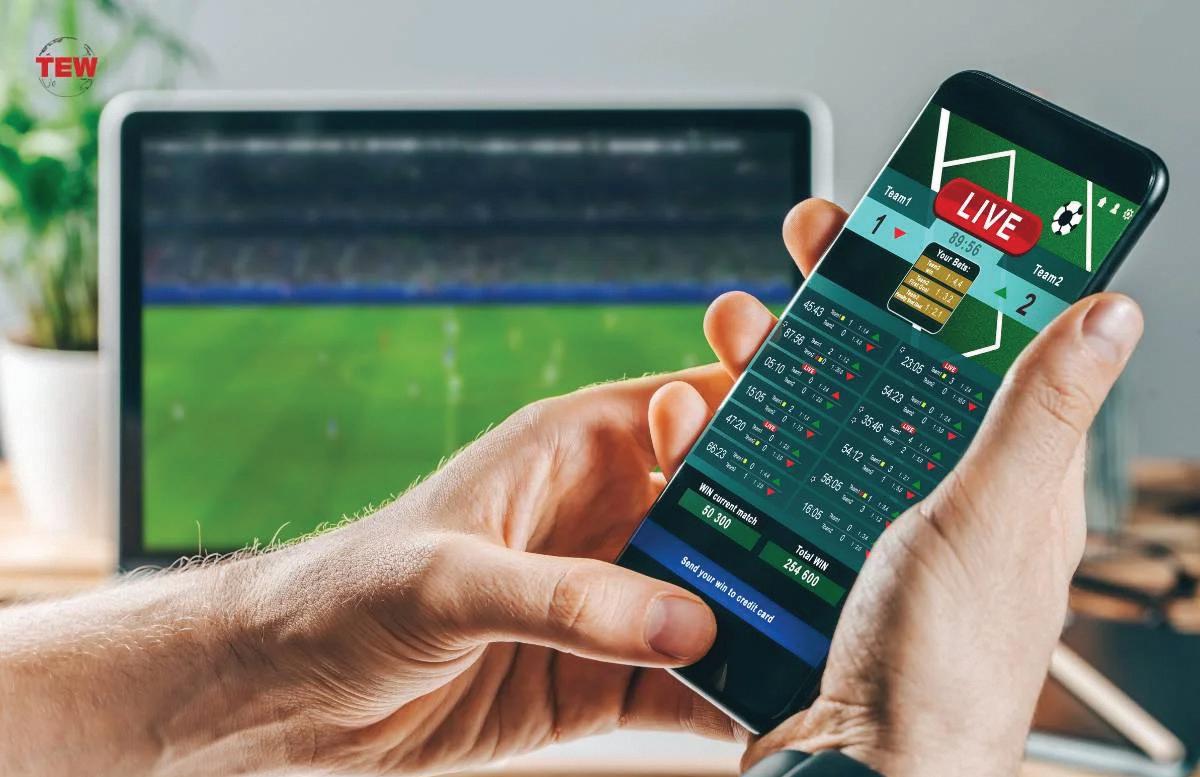
operations. The transparent regulatory framework also enables more effective monitoring and intervention for potential problem-gambling behaviors.
These partnerships have created diversified revenue streams for sports organizations while providing wagering operators with valuable content and brand association. The integration of betting content into sports broadcasts has also contributed to increased viewership metrics across multiple sports, with networks reporting five percent to 12 percent viewership increases for telecasts featuring betting-focused content.
The expansion of legal sports wagering across the United States has progressed at an unprecedented pace. Currently, 38 states plus Washington, D.C., and Puerto Rico have authorized sports wagering in some format, creating a regulatory framework that covers approximately 85 percent of the U.S. population.
This regulatory expansion has been accompanied by substantial market growth:
• Annual handle (total amount wagered) exceeded $100 billion in 2023

• Mobile wagering now accounts for over 85 percent of all bets placed in states offering both retail and online options
• Customer-acquisition costs have stabilized after initial marketentry periods
• Multiple operators have achieved profitability in established markets
• Technology and product innovation continue to accelerate
The industry has demonstrated remarkable adaptability to varying regulatory frameworks, with operators successfully navigating state-specific requirements while maintaining core business functionality. This flexibility has enabled continued expansion despite regulatory inconsistencies between jurisdictions. While the positive impacts of sports wagering legalization are substantial, the industry continues to address several challenges that require ongoing attention and strategic response.
With approximately 2.5 million adults affected by problem gambling annually, the industry has implemented comprehensive responsible gambling initiatives:
• Mandatory operator contributions to problem-gambling treatment and education
• Advanced analytics to identify potentially problematic betting patterns
• Technological tools enabling selflimitation and self-exclusion
• Cross-operator coordination on player-protection measures
• Staff training on responsiblegambling-intervention protocols These measures represent a significant advancement over the unregulated market’s lack of safeguards. Industry best practices now include proactive intervention when problematic behaviors are identified, rather than reactive responses.
Studies indicating a potential 25 percent to 30 percent increase in household bankruptcy risk associated with online betting access have prompted enhanced financial protection measures:
• Affordability checks for high-volume players
• Deposit and loss-limit functionalities
• Cooling-off periods after significant losses
• Restriction of credit-based funding methods
• Enhanced financial literacy resources
The industry has recognized that sustainable growth depends on responsible participation, with leading operators implementing increasingly sophisticated systems to prevent financial harm.
The current regulatory fragmentation creates operational inefficiencies and compliance challenges. Industry
associations are actively working toward greater standardization through:
• Model regulatory frameworks for new jurisdictions
• Cross-border cooperation on compliance requirements
• Technology standards for responsible-gambling tools
• Uniform approaches to data privacy and security
• Standardized self-exclusion protocols
While complete uniformity remains unlikely given states’ rights to determine their regulatory approach, incremental progress toward harmonization continues to improve operational efficiency.
To address match-fixing concerns, the industry has developed sophisticated monitoring capabilities, including:
• Real-time odds-movement analysis
• Betting-pattern-anomaly detection
• Cross-operator suspicious-activity reporting
• Information sharing with sports governing bodies
• Advanced statistical modeling to identify potential manipulation
These systems have proven effective at detecting potential integrity issues before they can significantly impact markets, providing a level of
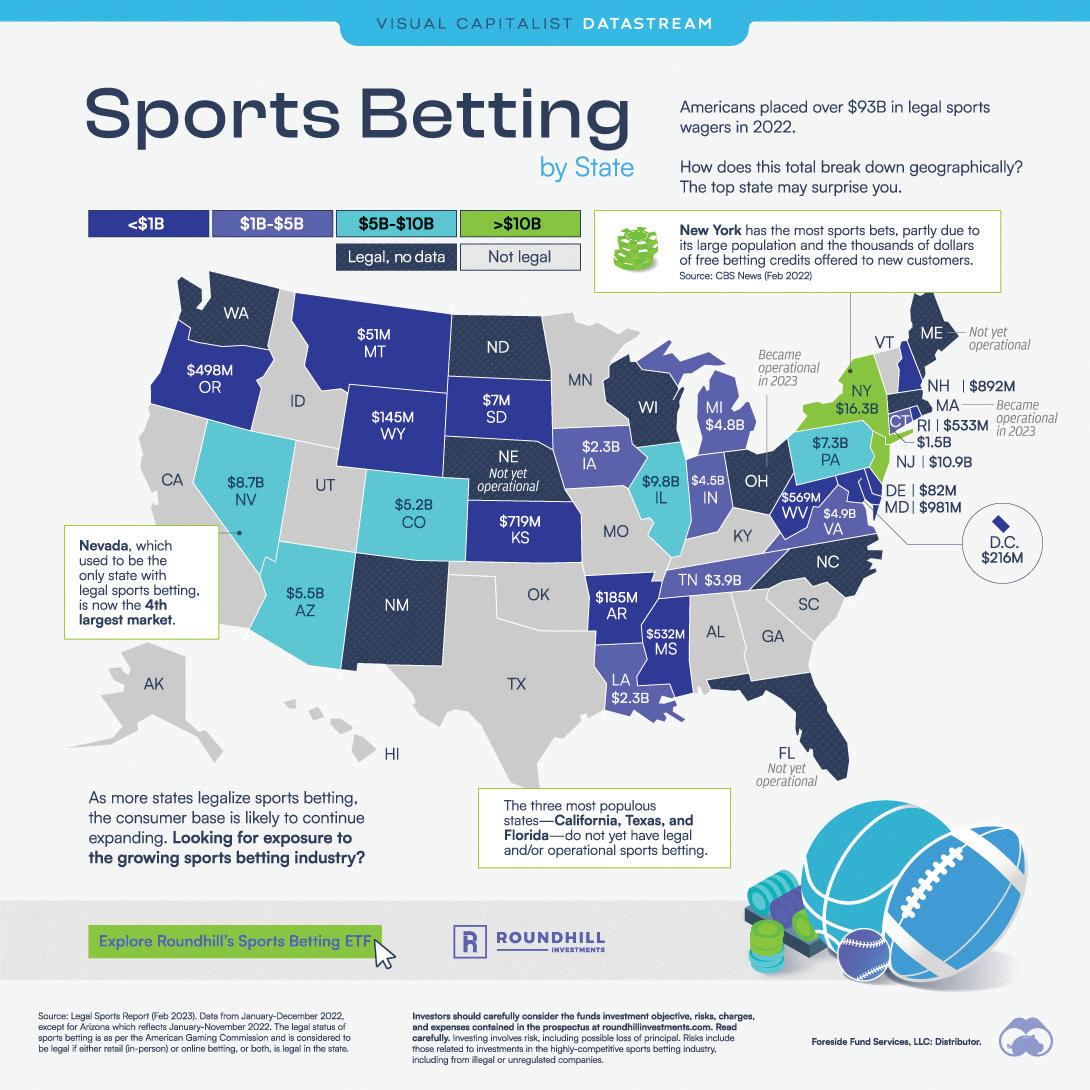
protection unavailable in unregulated environments.
Based on current performance metrics and growth patterns, the regulated sports wagering industry is positioned for continued expansion and maturation. Industry stakeholders should consider the following strategic priorities:
• Collaborative Advocacy – Industry operators should coordinate efforts to present unified positions on regulatory frameworks that balance growth opportunities with responsible-gambling protections.

• Technology Investment – Continued innovation in customer verification, responsible-gambling tools and user experience will differentiate successful operators while addressing potential concerns.
• Cross-Sector Partnerships – Deeper integration with sports media, venue operations and entertainment platforms offers significant growth opportunities beyond traditional wagering.




• Data-Driven Responsibility –Leveraging advanced analytics to identify problematic gambling behaviors before they escalate demonstrates the industry’s commitment to sustainable growth.
• Regulatory Engagement –Proactive participation in regulatory development can help ensure that new frameworks are both effective for consumer protection and conducive to business operations.
The regulated sports wagering industry has demonstrated substantial positive impact through tax revenue generation, job creation, consumer protection enhancement and strategic partnerships. While challenges remain, the industry has shown both the willingness and capability to address these issues proactively. The transition from prohibition to regulation has created a more transparent, accountable and beneficial ecosystem for all stakeholders. As the industry continues to mature, maintaining this balance between commercial opportunity and responsible operation will remain essential to sustaining the substantial economic and social benefits that legal sports wagering provides. By focusing on evidence-based policies, technological innovation and collaborative approaches to industry challenges, stakeholders can ensure that sports wagering continues its trajectory as a significant contributor to state economies while providing a safe, regulated entertainment option for consumers.

How social media and affiliate advertisers are exposing the vulnerable. By
Edwin Ford
The unregulated onlinegambling industry is growing at an alarming rate, posing significant risks to vulnerable individuals across the UK and Europe. These sites, offering both casino games and sports betting, are designed to circumvent critical safeguards meant to protect players. They are increasingly reaching at-risk populations through social media channels and affiliate marketers. Let us explore how unregulated gambling platforms are exploiting loopholes and what must be done to protect vulnerable players, especially those who have taken steps to self-exclude.
Unregulated gambling sites present a serious concern for public health and safety. While gambling in itself is not inherently dangerous, it can become addictive for some, leading to serious consequences. Unfortunately, these unregulated platforms make it easier for individuals – particularly those with a history of gambling problems – to continue their habits unchecked. The issue is compounded by the fact that many of these sites are easily accessible via social media and affiliate marketing, which often target individuals who are most at risk

of gambling addiction. As a result, vulnerable individuals (including those who have self-excluded and even underage players) are exposed to the dangers of these unlicensed platforms.
In the UK, Gamstop is a crucial self-exclusion program that allows individuals to voluntarily block themselves from licensed, online gambling sites. It helps those who recognize their gambling problem take control by preventing access to platforms they may find difficult to resist. This system also extends to land-based casinos and betting shops, ensuring that the individual remains excluded from all platforms linked to their chosen gambling group.
However, the effectiveness of Gamstop is being undermined by unregulated gambling sites that advertise themselves as “Gamstopexempt,” allowing self-excluded individuals to bypass their own protections. This exploitative loophole directly threatens the integrity of self-exclusion efforts and places individuals at risk of relapse.
Unregulated gambling sites also make use of technological workarounds, such as virtual private networks (VPNs) and proxy servers, to avoid detection and regulation. These tools mask a user’s location, enabling individuals to access gambling platforms even if their IP address is blocked by self-exclusion programs like Gamstop. This not
only complicates efforts by regulators to control access but also makes it easier for individuals to bypass restrictions and continue gambling.
One of the most concerning aspects of the rise of unregulated gambling platforms is their promotion on social media. Platforms like Facebook and Instagram are used to advertise these gambling sites through targeted ads, reaching specific demographics, many of whom are already struggling with gambling issues or are unaware of the risks involved.

These ads often include enticing offers such as bonuses or free spins to attract new players, including those who may not have intended to gamble in the first place. The powerful reach of social media allows these ads to be delivered directly to vulnerable individuals, making it all too easy for them to engage with platforms that undermine their attempts to stay away from gambling.
Some unregulated platforms also use e-games or points-based systems to hook vulnerable individuals, especially underage players. These seemingly innocent games allow players to earn points or rewards that can later be used for real-money gambling. While these games may appear harmless at first, they serve as a gateway to more dangerous forms of gambling, luring young people or those who are
not fully aware of the potential risks into an environment where they can easily develop problematic habits. For many young people, these platforms can create a false sense of safety, making them more likely to transition to real-money gambling once they are hooked on the excitement and rewards.
Affiliate marketing plays a key role in driving traffic to both regulated and unregulated gambling sites. Affiliates earn commissions for directing players to gambling platforms, but the issue arises when these marketers promote unregulated sites that bypass UK protections, including Gamstop. Often, affiliates redirect players from the UK to gambling sites based in jurisdictions with more-lenient regulations. These affiliates are incentivized to promote gambling sites regardless of the potential harm to vulnerable individuals. By prioritizing clicks and commissions over the well-being of the individuals they target, these marketers are contributing to the exploitation of vulnerable players.

While self-exclusion systems like Gamstop are crucial, they must be enforced across all platforms, including unregulated gambling sites. Governments and regulators must ensure that these systems cannot be bypassed, providing a unified barrier that truly protects individuals who are trying to manage their gambling habits. Additionally, social media platforms and affiliate marketers must take greater responsibility for the ads they allow on their sites. Platforms should implement stricter age-verification systems and actively monitor gamblingrelated content to prevent these unregulated sites from targeting vulnerable groups, including underage users.
The responsibility for protecting vulnerable individuals from unregulated gambling does not solely lie with the gambling industry. A collaborative effort
between governments, regulators, social media companies and affiliate marketers is essential to ensure that gambling remains a controlled, well-regulated activity. Just as organizations like GamCare, GambleAware, Gamban and Gamstop have worked to protect individuals, the media and tech sectors must take active steps to ensure their platforms are not used to promote unregulated gambling.
One notable advocate for this cause is Derek Webb, a former gambler and founder of the Campaign for Fairer Gambling. His work has highlighted the dangers of fixed-odds betting terminals (FOBTs) and the need for stronger self-exclusion programs like Gamstop. His advocacy continues to push for better regulations to safeguard individuals from unregulated platforms and to hold marketers accountable for their role in promoting gambling sites.
The rise of unregulated gambling sites is a growing issue that requires urgent attention. These sites – often promoted through social media and affiliate marketing – bypass essential safeguards like self-exclusion programs, placing vulnerable individuals at increased risk of addiction. They also target underage players, especially through seemingly harmless e-games and points-based systems.
To address this issue, stronger regulations, better safeguards for vulnerable groups and greater accountability for affiliate advertisers are essential. Only through a coordinated effort across the gambling, media, and tech sectors can we create a safer environment for individuals and protect those at risk of falling victim to unregulated gambling.
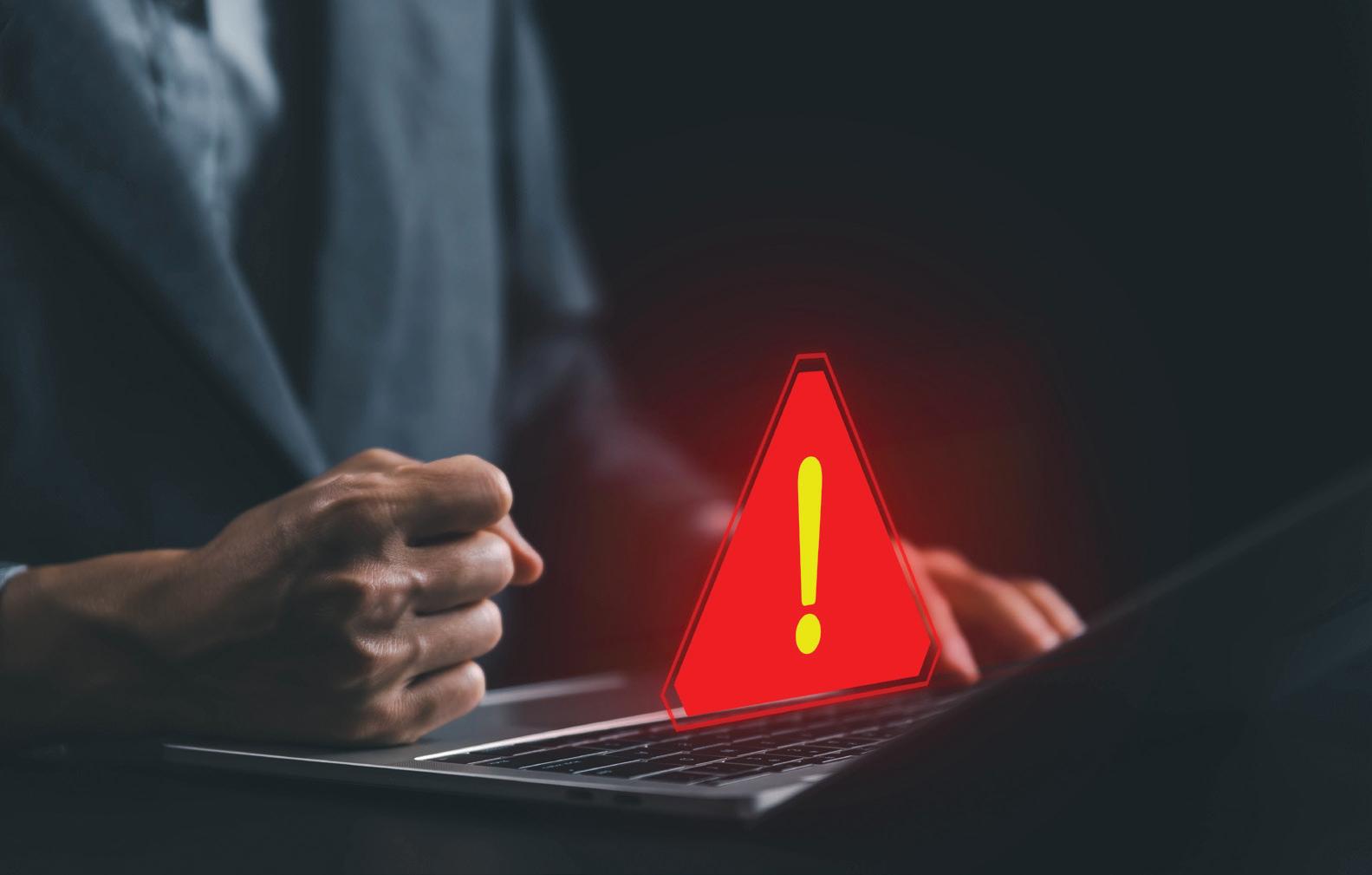
Tackling illegal online sports betting operators. By
Marko Mitevski
The explosive expansion of online sports betting transformed the international gaming industry, offering greater convenience and accessibility to global punters than ever before. However, this expansion has also meant the creation of a dark corner of illegal, online, sports betting operators who exploit regulatory loopholes, avoid taxes and suck huge revenues from legitimate businesses. This article delves deep into the heavy financial punches legal operators receive from illegal rivals and examines the intricate chain of actions by authorities to target illegal, online, gambling operations.
Internet illegal sports wagering is not an abstract issue; it is a tremendous underground economy. The illegal betting market worldwide is pegged at about $1.7 trillion annually according to the Asian Racing Federation, as published by Interpol. This enormous, unregulated business takes a big bite out of the legitimate operators’ business. The latter have to go through tough regulation, fees for licenses and taxation.
In the United States, despite the legalization of sports betting in some states, illegal operations dominate. For instance, during the 2024 March
Madness tournament, Californians — whose state still bans sports betting — wagered an estimated $3.1 billion on unregulated platforms. Not only does this deny legal operators their cut of the revenue but also the state’s significant tax revenue.
In Brazil, the market for online sports betting has grown explosively, with revenues of 120 billion Reais, or approximately $24 billion, in 2023. But between June 2023 and June 2024, Brazilians lost about 4.5 billion Reais to online betting, much of which is estimated to have ended up in the pockets of illegal operators. This highlights the huge financial drain on consumers and legitimate businesses alike.
Illegal online sports bookmakers typically exploit weakly regulated jurisdictions to establish their operations. Countries like Curaçao and Malta are typically known as licensing havens since they have little regulation. These licenses provide a veneer of legitimacy, allowing operators to promote to customers in countries that have strong regulation. These operators employ sophisticated tactics to remain hidden and evade law enforcement. Tactics involved include the use of virtual private networks (VPNs) to mask the location of users, shell companies to hide ownership and cryptocurrencies to facilitate anonymous transfers. Such tactics not only make enforcement difficult but also facilitate criminalproceeds laundering.
To counter the transnational nature of illegal sports betting in the cyber age, international law enforcement authorities have increased
collaborative efforts. In 2024, Interpol coordinated Operation SOGA X to combat illegal football betting during the UEFA European Championship. The operation covered 28 countries. It resulted in more than 5,100 arrests and the seizure of more than $59 million in criminal proceeds. The operation also revealed links between illegal betting and other offenses, including human trafficking and money laundering.
Separate countries have also undertaken national initiatives to crack down on illegal internet sports betting…
• The United Kingdom Gambling Commission has amplified the crackdown against illegal football gambling. Techniques involve undercover test purchases and strict due-diligence checks on licensed operators to ensure that they do not collaborate with unlicensed players.
• In Bulgaria, a member state of the European Union, over 600 unauthorized betting sites were directed to be blocked by the Bulgarian Tax Service at the beginning of 2024. Operators were given three days to close down or face proceedings in court.
• The Swiss Gambling Supervisory Authority (Gespa) collaborates with Switzerland’s Internet providers in order to block sites operating in illegal gaming. Swiss customers are thereby shielded from unregulated operators.
• The French National Gaming Authority (ANJ) targets blocking access to non-licensed websites through cooperation with ISPs, penalizing operators and ISPs that do not comply.
In addition to enforcement, legislative environments serve to discourage illegal online sports betting.
The Macolin Convention stands out as a multilateral convention aiming to prevent, detect, and punish matchfixing and illegal sports betting. It emphasizes international cooperation and establishing national regulatory bodies for regulating sports betting activities. Still, only 43 countries are signatories and this issue should be fought by a much wider number of countries.
In the U.S., legitimate wagers bear a 0.25 percent tax and an inferior 2 percent tax on illegal wagers. This is meant to discourage illegal wagering as it minimizes its financial advantage.
Technological advancement has become the focal point of detection and combating illegal online sports betting.
Sportradar’s Fraud Detection System monitors betting patterns to detect anomalies that may indicate match-fixing or illegal betting.
FDS detects suspicious behavior by examining odds movement and comparing it to statistical trends.
In Turkey, the Financial Crimes Investigation Board (MASAK) identified over 280,000 bank accounts used for collections of illegal bets between 2022 and 2024. Over 3,000 virtual point-of-sale systems used for illegal betting were shut down by authorities as well.
Despite all these concerted efforts, several challenges still persist. Operators in jurisdictions where regulations are lenient can continue to target users in

jurisdictions where regulation is strict, complicating enforcement. VPNs and cryptocurrencies allow illegal operators to be anonymous and not traced, and this is an issue that will be tough to battle.
More cooperation among countries can facilitate the sharing of intelligence and collective enforcement action. Educating the public on the dangers of illegal gambling discourages customers from patronizing illegal operators. Continuing investment in detection technology can heighten detection and disruption of illegal activities.
Illegal online sports betting poses a significant threat to the integrity of sport, the livelihood of genuine operators and consumer protection. Significant progress has been made in addressing these illegal activities but continued vigilance, international cooperation and technological innovation are necessary in order to stay ahead of increasingly sophisticated illegal operators. Addressing the issue with a committed and concerted effort can make the environment safer, and better controlled for sports betting.

1xPartners is an effective and simple solution for earning money online
Joining 1xPartners, the affiliate program of leading betting company 1xBet, is a great opportunity to earn income alongside a flagship of the rapidly growing gambling industry. The community includes over 300,000 entrepreneurs who attract millions of players to the 1xBet platform each month and enjoy stable, high earnings.
1xBet ranks among the top three most-visited betting platforms, offering players high odds, a wide betting line and numerous exciting promos with valuable prize draws. As a result, 1xPartners provides unlimited opportunities for effective traffic monetization — members can share referral links and promo codes across websites, blogs, social media platforms, and messaging apps.
By joining 1xPartners, affiliates gain access to a comprehensive suite of marketing tools designed to maximize profits, receive support at every step of the partnership, and unlock exclusive opportunities for business growth and scaling:
• Industry-leading conversion rates of up to 70 percent
• Generous commissions of up to 50 percent
• Multiple traffic models supported –CPA, Hybrid, and Revshare
• Flexible and transparent profit system with weekly payouts
• Real-time analytics and performance monitoring
• Diverse commission structures
• Support for 250-plus payment methods for withdrawing earnings
• Dedicated personal-account managers
• Cross-platform software – web, iOS, Android
• Global reach – 150-plus countries
This explains why 1xPartners is chosen by both beginners and seasoned entrepreneurs.
1xBet and its affiliate program 1xPartners adhere to the highest standards of quality and reliability, as confirmed by high praise from industry experts. Recently, the brand has earned several prestigious awards:
• Affiliate Company of the Year –International Gaming Awards 2024 & SiGMA Asia Awards 2024
• Best Bookmaker of 2025 – SiGMA Americas Awards 2025
• Best Sportsbook Operator – SiGMA Africa Awards 2024
• Best Mobile Sports Betting App 2024 – SiGMA Europe
• Best Esports Operator in Latin America – SiGMA Americas Awards 2024
• Best Mobile Casino Experience –SiGMA Eurasia Awards 2024
• Best on Mobile 2025 – SiGMA Africa Awards 2025
• Best Crypto Operator in Eurasia –SiGMA Eurasia Awards 2025
The 1xBet and 1xPartners brands have built a strong reputation as reliable and professional players in the global sports industry. Among the bookmaker’s official partners are FC Barcelona, Paris Saint-Germain, Serie A, FIBA, Volleyball World, and other internationally renowned clubs and organizations. 1xBet was also one of the first in the industry to recognize the growing potential of esports and now actively collaborates with major
names such as ESL, Beastcoast, MIBR, and The Mongolz.
1xBet strives for excellence, delivering top-tier products to both partners and players. Its success in early 2025 marks a major step in reinforcing the brand’s leadership in the industry. In January, the company won “Mobile Sports Product of the Year” at the International Gaming Awards. The 1xPartners team also participated in key industry events such as ICE Barcelona and iGB Affiliate. The team shared expert insights, expanded the affiliate network and showcased unique earning opportunities. 1xBet also hosted an exclusive partner party in Barcelona, headlined by worldrenowned British singer John Newman.
In February, 1xPartners unveiled a dynamic booth at SiGMA Eurasia 2025 in Dubai. Attendees enjoyed high-value networking, insightful discussions and exciting giveaways. Prizes included a branded PlayStation 5, tickets to a Paris Saint-Germain match with VIP access to a training session, and stylish merchandise – all presented by former footballer Gregory van der Wiel.
In March, 1xBet took center stage at SiGMA Africa 2025, earning yet another award at the SiGMA Africa Awards and hosting an unforgettable event, with a bold Pop-art Luxury theme for its partners
The momentum continued in April, as 1xBet was named “Best Bookmaker of 2025” at the SiGMA Americas Awards. The brand isn’t slowing down – the team is already gearing up for upcoming expos in order to present its offers at the highest level.
1xPartners sets the global standard in affiliate marketing and is the perfect choice for those looking to turn players’ passion into sustained highyield profits.

Tackling illicit betting through payment monitoring: The role of the IBIA Brazil Payment Provider Forum. By Ari Celia (Pay4Fun) and Marcelo Bueno (Z.RO Bank), co-chairs of the IBIA Payment Provider Forum
Brazil’s long-awaited regulation of online betting and gaming, in effect since January 1st of this year, marked a milestone in the development and oversight of the country’s digital
and gambling economies. After years of anticipation, the sector is now equipped with a robust legal framework – crafted under the leadership of the Secretaria de Prêmios e Apostas (SPA) and supported by the National Congress –
that provides for consumer protection, responsible play, product integrity and public-revenue generation.
Yet while the legal foundation is finally in place and the opportunities are significant, we need to address the risk unregulated sports betting poses to the market and the sports-integrity ecosystem.
Licensed operators – those who have committed to the rules and now contribute to Brazil’s tax base –continue to face an entrenched and dangerous adversary: the sprawling, persistent, illegal-betting sector. These unregulated platforms do more than just siphon off market share. They undermine trust, distort consumer behavior, and open the floodgates to a host of financial and social issues. They are the primary source of player-protection and sports-integrity concerns.
Among the most pressing concerns is money laundering. Unlicensed operators, operating outside of the reach of Brazilian oversight, often serve as convenient vehicles for disguising illicit funds. With little to no enforcement of Know Your Customer (KYC) obligations, and offering anonymity, rapid movement of funds and little traceability, these platforms are very attractive for organized criminals looking to launder illicit funds. These can also be linked to the manipulation of sports competitions and related betting. When left unchecked, such activity can destabilize the regulated financial system and undermine national efforts to combat wider financial crime. Equally damaging is the proliferation of fraud. From identity theft and fake promotions to the manipulation of software and refusal to pay winnings,

ABOVE:
Ari Celia, director of institutional relations and co-founder of Pay4Fun
illegal sites frequently engage in practices that defraud customers while giving the appearance of legitimacy. These tactics are especially harmful in a nascent market like Brazil’s, where consumer awareness is still developing and digital literacy varies widely.
Perhaps the most insidious threat is reputational. The blurred lines between legal and illegal offerings – amplified by social media influencers who promote unlicensed betting as a path to quick income – risk eroding public confidence in the entire sector. If left unchallenged, this can undermine the credibility of legitimate operators, fuel skepticism about gambling regulation, and compromise the industry’s longterm growth, all of which are essential in the fight against sports-bettingrelated match-fixing and fraud.
Some may argue that these challenges are common to all newly regulated markets. That is true. But Brazil possesses a strategic advantage that most countries do not: Pix.

Pix, Brazil’s government-backed, instant-payment system, offers a powerful mechanism for identifying and disabling illegal transactions at their source. Unlike other countries where payment ecosystems are dispersed and opaque, Pix operates under the strict oversight of the Central Bank of Brazil. All participating institutions must be licensed and regulated.
This presents a unique enforcement opportunity. Instead of pursuing anonymous operators scattered across borders, Brazilian authorities can focus on a smaller and more-visible target group: payment providers. By cutting off access to this financial gateway, the flow of funds to illegal websites can be interrupted, weakening their operations and shrinking their footprint.
This is why the payment sector is so pivotal to Brazil’s regulated future. And it is why the IBIA Payment Provider Forum was created.
LEFT: Marcelo Bueno, chief legal officer (CLO) at Z.ro Bank
Brazil’s regulated betting environment holds great promise, not just for operators and consumers, but for the broader economy. Yet its success depends on the willingness of all stakeholders to uphold the rules and confront malpractice wherever it arises.
Payment providers are on the front lines of this effort. By aligning with integrity-focused initiatives such as the IBIA Payment Provider Forum, we can play a critical role in preventing illicit transactions, protecting consumers and ensuring that Brazil’s digital betting economy grows on solid foundations.
Convened by the International Betting Integrity Association (IBIA), the Forum unites Brazil’s leading payment institutions, all of whom are committed to lawful conduct, regulatory compliance, the protection of consumer interests and the integrity of sporting events.
The Forum’s mission is clear: to promote collective action, share intelligence and raise standards across the entire payments chain. This is not just about avoiding legal risk: It’s also about shaping a healthy and sustainable betting market in Brazil.
As signatories of the Forum’s Declaration of Commitment, our goals are to:
• Collaborate in the development of standards and best practices for payment processing.
• Engage with regulatory bodies to defend a robust, fair and effective regulatory framework.
• Promote responsible gambling and consumer-market and sportingevent protection.
• Share knowledge and expertise to innovate and improve the payments ecosystem.
• Maintain the highest standards of ethical conduct and compliance with regulations.
Brazil’s regulated betting environment holds great promise, not just for operators and consumers, but for the broader economy. Yet its success depends on the willingness of all stakeholders to uphold the rules and confront malpractice wherever it arises.
Payment providers are on the front lines of this effort. By aligning with integrity-focused initiatives such as the IBIA Payment Provider Forum, they play a critical role in preventing illicit transactions, protecting consumers and ensuring that Brazil’s digital betting economy grows on solid foundations. Launched in Brazil at the end of February 2025, the Forum is now
gaining momentum. It has already held a second meeting in April and is planning two more before year’s end, each designed to deliver concrete outcomes.
As co-chairs, we invite more payment institutions to join us. Together, we can help make Brazil a global reference point for safe, fair and regulated betting, powered by a payment system that leaves no room for abuse.
It is crucial that global stakeholders pay close attention to this unique opportunity: a chance to work alongside Brazil. You will not only share the lessons learned from more-mature markets but also learn from our innovative approaches to combating financial crime –especially through the many new perspectives emerging from our experience with Pix.




















The International Betting Integrity Association (IBIA) has published its latest integrity report, revealing 63 alerts of suspicious betting activity during the first quarter of 2025. The figure is slightly down from the 65 alerts recorded in Q4 2024 and a little ahead of the revised total of 57 alerts from Q1 2024.
IBIA’s global monitoring network, which provides sports-integrity monitoring for over $300 billion in global betting turnover annually, flagged suspicious betting activity across six sports in 23 countries, spanning five continents during Q1. With more than 80 members and 140 sports betting brands under its watch, IBIA continues to serve as a leading force in safeguarding the integrity of the regulated sports-betting industry.
• Football and Tennis Dominate Alerts: These two sports accounted for 64 percent of all alerts (40 in total), marking a 14 percent rise from the 35 reported in Q4 2024.
• Regional Breakdown: Europe and North America combined accounted for 32 alerts (51 percent of the total), reflecting a 29 percent drop from the 45 reported in Q4 2024.
• Table Tennis Decline: The sport saw a notable reduction in alerts from 21 reported in Q4 2024 to nine reported in Q1 2025, representing a 53 percent quarter-on-quarter fall.
Speaking to Sports Betting Operator,
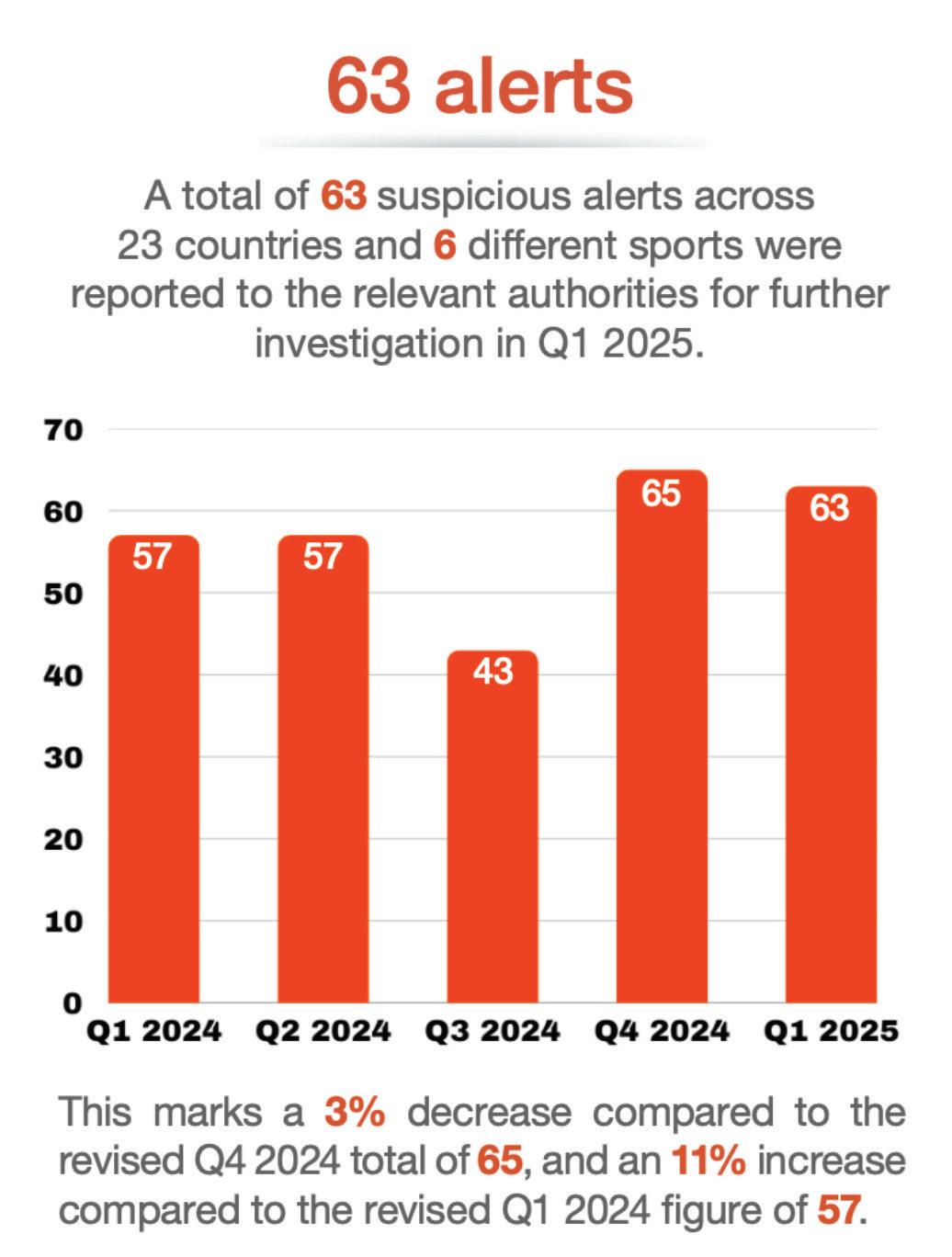
Khalid Ali, CEO of IBIA, commented, “The first quarter of 2025 was relatively consistent with both the previous quarter and Q1 last year. Football and tennis remain the sports with the highest number of reported alerts, although the slight decrease compared to Q4 2024 was largely due to fewer tennis-related alerts. Notably, the increase in table tennis alerts we saw at the end of 2024 did not continue into 2025, dropping back to earlier levels.”
He also highlighted IBIA’s proactive steps in response to past alerts. “We have intensified our monitoring and established new integrity partnerships

focused on high-risk sports such as table tennis. These initiatives are designed to better detect and sanction corruption in betting markets,” said Ali.
The report underscores the value of IBIA’s global-monitoring network as a cornerstone in the fight against betting-related match-fixing. That network is a highly effective anticorruption tool, detecting and reporting suspicious activity in regulated betting markets using transactional activity linked to
individual customer accounts, which is only available to IBIA and its members.
In late 2024, IBIA implemented a major upgrade to its technology framework, significantly enhancing its ability to monitor for suspicious betting patterns, improve data analysis and deliver actionable insights to key stakeholders. The upgraded system allows for faster, more-precise detection and response, underpinned by real-time, granular account-level data. This includes tailored data
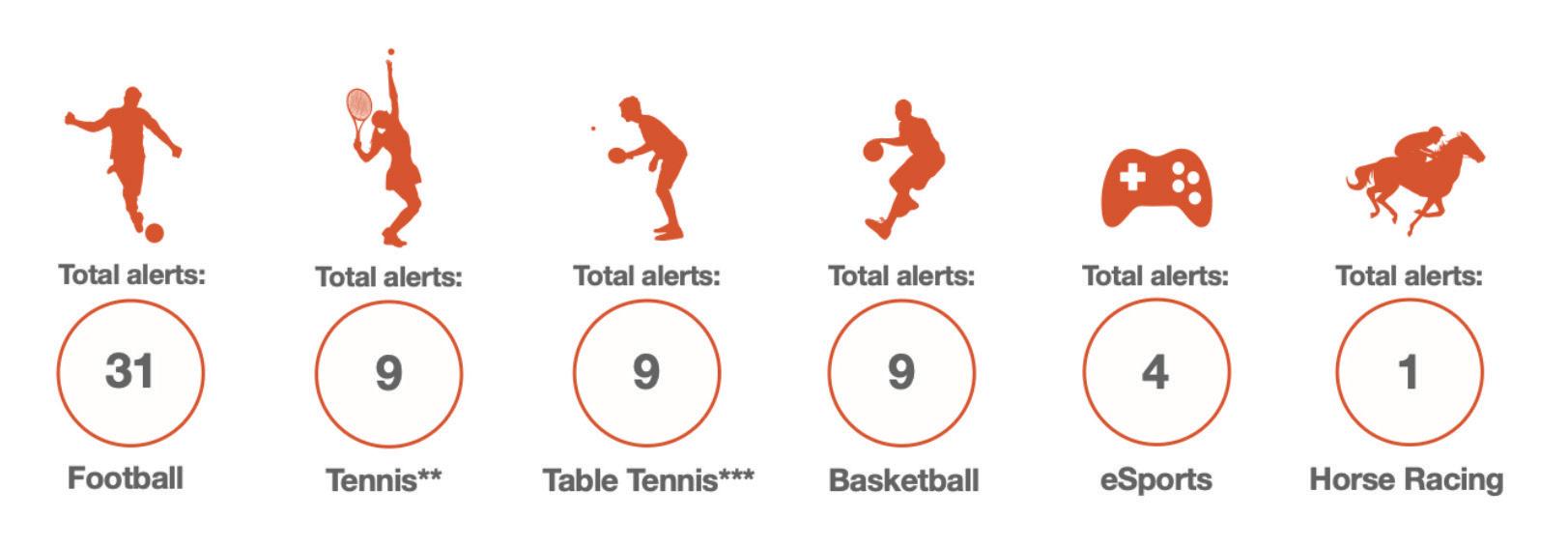

streams for critical partners — such as gambling regulatory authorities — thereby strengthening operational cooperation and supporting investigatory actions with greater efficiency.
Ali reports that, “The upgrade allows us to provide a technological platform that keeps pace with the integrity requirements of our growing membership, and the scope and scale
LEFT: Khalid Ali, CEO of the International Betting Integrity Association (IBIA)
of the market data we receive across our wider intelligence network. It will be a key pillar in our ongoing efforts to protect the integrity of sporting events and regulated sports betting markets globally.”
This enhanced collaboration reinforces trust in the integrity of global betting markets and plays a pivotal role in safeguarding fair competition. As the sports betting industry continues to grow, maintaining robust integrity protocols remains critical. IBIA’s principal goal is to protect its members, consumers and partners – including sports governing bodies – from the threat posed by the manipulation of sporting events. The Q1 integrity report offers both reassurance and a timely reminder that sustained vigilance, backed by data-led monitoring and cross-sector collaboration, is essential to upholding fair play and trust in regulated betting markets.
Once

Reimagining sports book trading with virtual AI agents. By
Artificial Intelligence (AI) is no longer just the future of sports book trading. It is the present. While much of the industry discourse has focused on AI for odds optimization or customer segmentation, the real innovation lies deeper: We can now virtualize an entire sports book trading team’s functions using AI agentic agents.
In recent years, I have worked with multiple sports book and casino operators navigating digital transformation across the iGaming ecosystem. One theme is now impossible to ignore: Traditional trading teams, constrained by headcount-heavy models and operational limitations, struggle to keep pace with the demands of modern sports betting. The solution is not simply to scale up with more hires,
Mark McGuinness
it’s to innovate. That’s where virtual AI agents come into play.
Imagine an always-on trading department that never sleeps, never burns out and improves with every market it analyzes. A virtual AI trading team is a decentralized, constantly active framework of intelligent software agents, designed to perform specific tasks within the trading operation. These agents go beyond basic automation scripts; they are purpose-trained, adaptive systems that learn from data, follow defined standard operating procedures (SOPs) and make unbiased decisions at scale. Whether it’s pre-match pricing, in-play risk management, margin adjustment or early detection of irregular betting patterns, these agents

Mark McGuinness is a global marketing executive with 20-plus years’ experience in Web3, iGaming, and crypto. As CMO of Devilfish.com, he pioneers community-led growth, integrating NFTs and decentralized tech to reshape social poker through Digital Avatars, co-creation, and microtransactions for the next generation of free-to-play players.
can work autonomously or alongside human traders in a hybrid framework. The result is a trading operation that is leaner, faster and significantly more cost-effective, all without sacrificing accuracy or compliance.
The sports betting market never sleeps. From global football to regional table tennis, events happen around the clock. Yet few operators can afford to maintain full capacity staffing 24/7. Relying on skeleton night teams or outsourcing key decisions to third parties often leads to inconsistent pricing, slower response times and missed opportunities. With AI agents in place, coverage becomes continuous. These agents can monitor markets, adjust pricing or flag risks at 3 a.m. just as effectively as during peak hours. This provides sports books with both a tactical advantage and a structural one, therefore liberating them from the limitations of a traditional 9-to-5 model.
LEFT: Mark McGuinness
It is important to clarify: The goal isn’t to replace human traders. It’s to remove low-value, repetitive tasks that bog them down, allowing them to focus on higher-order decisionmaking. When configured correctly, AI agents become powerful collaborators. They can process thousands of data points per second, model complex risk scenarios and respond to real-time betting patterns.
Human traders bring domain knowledge, strategic context and instinct, while virtual agents provide scale, consistency and real-time precision. Together, they create a symbiotic model that outperforms either system when working alone.
Regardless of skill, every trading department is vulnerable to human bias. Overestimating the strength of a popular team, reacting emotionally to sharp money or missing subtle market shifts due to fatigue can cost operators dearly – and it does!
In contrast, AI agents operate within predefined parameters and training data sets, bringing objectivity to the trading floor, when built ethically and appropriately. They are not influenced by weekend headlines or social media hype, and every decision made is auditable, providing a clear log of why specific actions were taken … an invaluable asset in highly regulated environments.
It’s important to note that AI is only as effective as the framework that governs it. Poorly trained agents or opaque algorithms can cause just as much damage as inattentive traders. Therefore, it is crucial to establish clear
SOPs, define acceptable thresholds, and continually refine models with fresh data and feedback loops.
Deploying a virtual AI trading team is not a one-size-fits-all solution; it’s a modular system of specialized agents, each trained for specific trading tasks. A typical structure might include the following:
• Market-Sentiment Agent: Scans live feeds, news and social media for price-impacting events.
• Pricing Agent: Adjusts pre-match and in-play odds using real-time and historical data models.
• Margin-Management Agent: Dynamically adjusts margins based on volume, risk exposure and market liquidity.
• Compliance Agent: Ensures all pricing and adjustments remain within regulatory and risk parameters.
• Risk-Alert Agent: Flags unusual betting activity or sudden line movement for review.
Each agent reports to a central orchestration layer that ensures coordination across markets and alignment with your house strategy. The human trader’s role shifts from executor to overseer, providing strategic guidance, resolving edge cases and fine-tuning the system.
Let’s talk numbers. Traditional trading departments are often some of the most resource-intensive parts of a sports book operation. Hiring, training,


and retaining skilled traders across multiple time zones is a logistical and financial challenge. With a virtualized framework in place these costs can be dramatically reduced.
More importantly, the upside grows exponentially. Faster response times mean better odds efficiency and higher margins. Improved risk detection means fewer liabilities. Round-the-clock coverage opens up new market segments and time zones without requiring new hires.
It also introduces better scalability. When launching in a new market, you can train a region-specific agent


to adapt to that betting culture without rebuilding an entire team. This flexibility gives you a competitive edge in a globalized sports-betting landscape.
As with any AI deployment, there are ethical considerations. Transparency must be built into the system. You must ensure agent decisions are explainable, accountable and aligned with responsible gambling frameworks. Just because an agent can make a call doesn’t mean it should be without human review. Moreover, regulatory scrutiny is increasing. Demonstrating that your AI systems operate within defined
guidelines, are trained on fair and representative data, and can be audited is essential for long-term viability.
To successfully implement a Virtual AI Agent framework, sports betting operators need to take several preparatory steps:
1. Audit Your Existing Trading Functions – Identify what can be automated and what must remain human-led.
2. Build a Governance Layer – Define rules, escalation paths and fail-safes.
3. Train Your Human Team – Equip them to work with AI, not against it. Roles will evolve, not disappear.
4. Start Small and Scale – Test agents on a single sport or market before rolling them out.
AI is no longer just a support tool. It is becoming the new backbone architecture of sports book operations. The sooner we accept that trading teams can be virtualized, the faster we can move towards leaner, more efficient and round-the-clock operations. As an industry, we must stop worrying about how many traders we need to hire and start designing trading ecosystems that blend the best of human insight and artificial intelligence. The winners of the next five years won’t just be those who adopt AI. They’ll be those who learn how to orchestrate it. And in a game where margins matter and milliseconds count, the edge won’t go to the biggest operator or sports betting platform provider. It will go to the smartest.









2 - 3 JULY 2025







